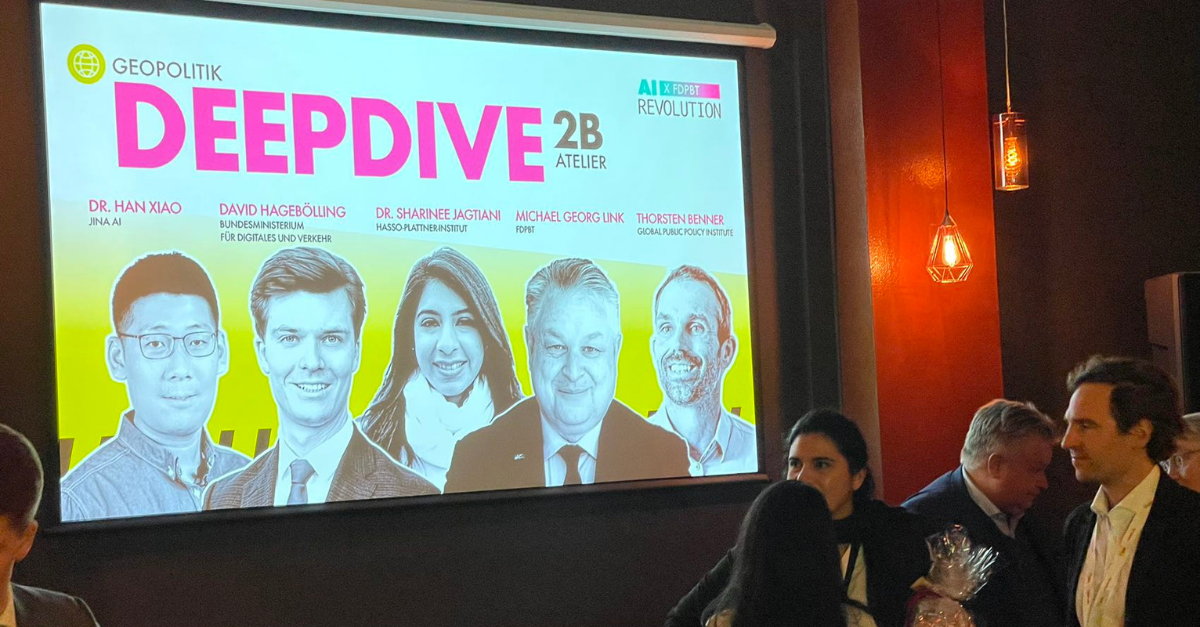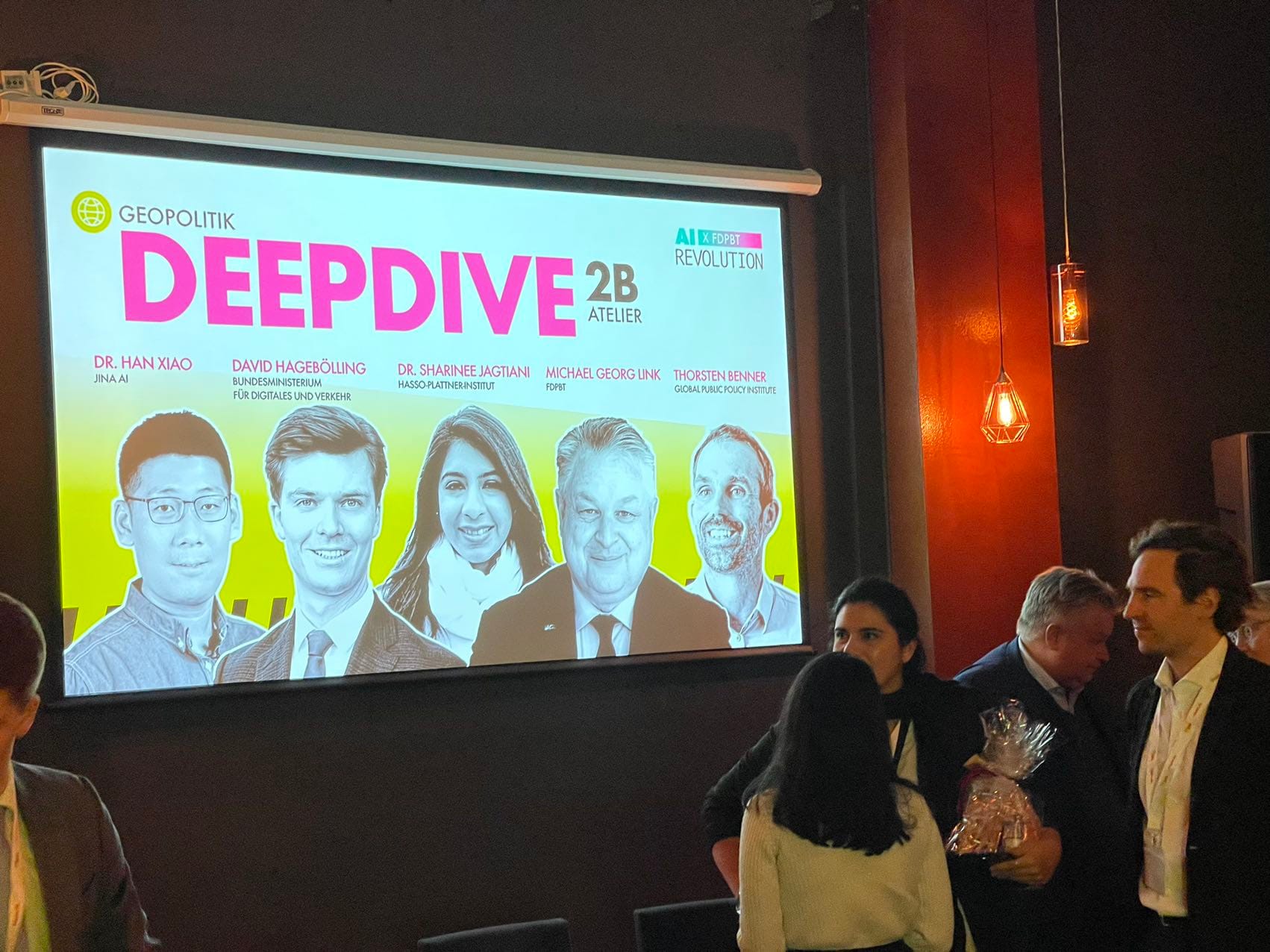Give and Take in FDP's AI Geopolitics Panel
This blog post captures my personal reflections and contributions to the panel, highlighting key differences in AI strategies among global powers like the US, China, and the EU.

The crisp air of Berlin in late November carried a unique vibrancy, especially in the bustling district of Prenzlauer Berg. As I weaved through the lively Christmas market outside the Palais der Kulturbrauerei, the scene was a microcosm of Berlin itself. Stalls adorned with twinkling lights offered an array of handmade trinkets and steaming treats, drawing in a crowd that was as diverse as the city's own character. Artists, both emerging and established, mingled with locals and tourists, their conversations a blend of German and a myriad of other languages, creating a tapestry of global influence and local charm.

As I approached the Palais, the sounds of the market slowly gave way to a more subdued atmosphere. Inside, the venue buzzed with the energy of intellectuals and policymakers, all gathered to dissect and debate the future of EU's AI.

The full program of this FDP event is available here.
Despite my role as a panelist and my years of experience in AI, spanning from Tencent AI to my own AI startups, I couldn't shake a sense of skepticism. Was my presence here truly impactful? Would the discussions tonight resonate beyond these walls?

The air was thick with expectations as the panelists, including myself, took our seats. I was curious to hear the perspectives of my fellow speakers and the FDP's stance on these pressing issues. While I harbored doubts about the overall impact of such events, a part of me remained hopeful. Perhaps, through these discussions, we could foster a deeper understanding between Europe and China, bridging gaps in perception and strategy.
Below, you'll find my responses to the questions posed during the panel. Some answers have been expanded and further refined during my subsequent reflections.
Strategies and positions of major powers
Q: How do the strategies and positions of the US, China and the EU differ in achieving global leadership in AI?
Han: In discussing how the strategies and positions of the US, China, and the EU differ in achieving global leadership in AI, I would start by highlighting that the US primarily drives innovation through the private sector with substantial funding and the robust Silicon Valley ecosystem. In contrast, China adopts a state-driven approach, utilizing large-scale data and focusing on rapid implementation of AI technologies. The EU, on the other hand, places a strong emphasis on ethical AI, developing regulatory frameworks, and maintaining a focus on human-centric AI.
Diving deeper into China's approach, we see ambitious state-driven initiatives, with the goal of becoming an AI world leader by 2030. This is rooted in a legacy of central planning and a national capitalism ethos. There's a significant emphasis on indigenous innovation, mirroring European approaches, but with a distinct focus on technological sovereignty. Talent development is also key, as evidenced by China's "Thousand Talents" plan, which aims to bolster AI expertise.
Large-scale data usage in China is a critical factor, with vast data repositories enhancing algorithm accuracy. This is supported by multidimensional datasets, particularly rich user data derived from diverse smartphone activities. When it comes to implementation, China has developed 79 large language models, each with over 1 billion parameters, showing remarkable progress. The focus here is on practical application, transitioning from discovery to a strong execution in "1 to n" innovation.
In contrast to the US, which focuses more on discovery, China excels in the implementation and application of AI technologies. This difference highlights a unique approach where China leverages its strengths in rapid development and practical application of AI solutions.
Cooperation versus regulation
Q: Should countries limit or expand their collaborations in AI research due to geopolitical rivalries?
Han: When considering whether countries should limit or expand their collaborations in AI research due to geopolitical rivalries, it's tempting to adopt an old cold-war mindset. It's easy to see why the US might be hesitant to collaborate: they don't want to share their technological leadership, have security concerns, face economic competition, and grapple with ideological differences. In German, there's a saying "Wer oben ist, will oben bleiben," meaning "Those who are on top want to stay on top."
However, collaboration is the only rational way to accelerate AI development. The United States is known for its advanced AI algorithms and strong research capabilities, while China boasts vast data resources essential for training AI models.
The ideal scenario would involve collaboration between the US and China, specializing in AI excelling in efficiency and scalability, but we must be mindful of potential issues with global trust and acceptance due to weaker ethical and privacy safeguards. Similarly, collaboration between the US and the EU could yield technologically sophisticated, ethically compliant AI, but might struggle with data diversity and comprehensiveness. China and the EU could focus on ethically-grounded AI with rich data integration but might lag in incorporating the latest AI innovations. The best outcome would be a balanced AI, leading in innovation, ethics, and data scope, overcoming individual limitations.
A balanced approach is necessary, considering geopolitical tensions and concerns about data privacy, security, and ethical use of AI.
However, the reason China might be reluctant to open its arms fully to US AI is due to a focus on cultural and political autonomy. The Chinese emphasis on indigenous innovation is partly driven by concerns over cultural influences and values being exported through U.S.-dominated AI, especially in terms of political influence.
Information sovereignty is crucial for ensuring that AI development aligns with national values and interests, avoiding external cultural or political influences.
A true story illustrates this point: Post-WWII, Japan was heavily influenced by American ideas, including the notion that a bread diet was superior to rice for health. This belief, supported by some Japanese scholars and the government, led to significant changes in dietary habits in Japan, decreasing the country's self-sufficiency in food and increasing reliance on imports from the United States. This example shows how foreign influence can profoundly impact national culture and practices.
Q: Should the EU work even more closely with strategic partners like the US?
Han: Understanding the EU's inclination to collaborate with the US in AI is straightforward, as the US is a leader in AI innovation, which can complement the EU's strengths in regulatory frameworks. Additionally, the EU and US often share common values such as democracy, human rights, and privacy, aligning closely in AI development.
However, working with China also presents significant advantages. China ranks in the top 3 globally for AI vibrancy, as per the Stanford AI Index. Its AI market is projected to exceed $26.7 billion by 2026, offering the largest real-world testing ground for AI innovations, invaluable for global scalability. The sector diversity in China, with strong AI adoption in finance, retail, and high tech, and leadership in consumer AI apps, is noteworthy. Additionally, the automotive AI potential in China, being the world's largest auto market, presents significant opportunities, especially in autonomous vehicles and fleet management, with an estimated $380 billion economic value by 2030.
Challenges and opportunities for the EU
Q: Compared to individual state actors such as the US and China, how can the EU maintain its competitiveness?
Han: The EU faces significant challenges in maintaining competitiveness with individual technological powerhouses like the US and China. One of the main hurdles is technological lag, with European companies generally underperforming compared to their US counterparts, especially in terms of growth and R&D investment. This is reflective of Europe's lag in the last technology revolution, notably in ICT and disruptive innovations.
Moreover, there are stark investment disparities in key future technologies such as quantum computing, 5G, and AI. For instance, in AI, Europe only captured about 12% of external funding between 2015 and 2020, compared to 40% by the US and 32% by Asia, including China. This gap in investment is a significant factor contributing to the EU's challenges in maintaining technological competitiveness.
Q: Does the EU offer any specific advantages?
Han: The EU indeed offers specific advantages in the realm of AI. Europe boasts a rich talent pool and a strong tradition in theoretical AI research and mathematics. Notable European AI researchers include Yoshua Bengio from France/Canada, a leader in deep learning, Jürgen Schmidhuber from Germany, known for his work on neural networks, and Max Welling, a Dutch computer scientist recognized for his contributions in machine learning and AI. Esteemed institutions like the Max Planck Institutes in Germany and INRIA in France have been at the forefront of significant AI advancements.
Europe is often seen as the 'Switzerland of AI politics,' maintaining a neutral position amid US-China tech tensions. This neutrality is strategic, enabling Europe to focus on ethical AI development and collaborate innovatively without getting entangled in geopolitical struggles.
The EU's approach is characterized by the motto, "In Europe, we don't just have history in our museums; we also make history in our AI labs." This reflects Europe's unique position in observing and learning from the technological race between the 'eagles' (US) and 'dragons' (China), emphasizing the importance of foresight in addition to speed.
In conclusion, AI is a transformative force comparable to the Industrial Revolution. Europe's stance encourages teamwork, openness, and curiosity. If not leveraged, there's a risk of turning this revolutionary era into a missed opportunity, relegating Europe to a spectator's role in this global race.
